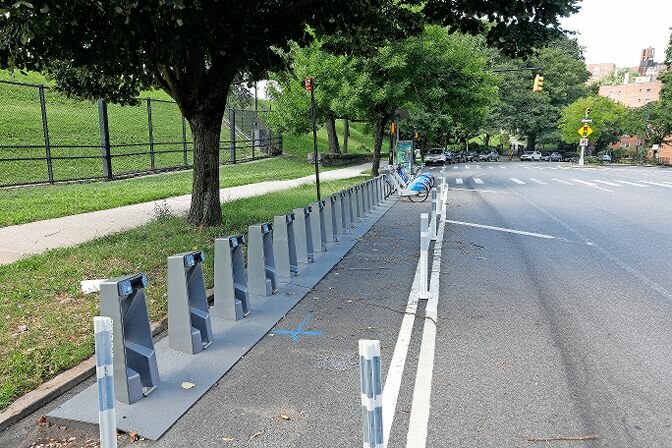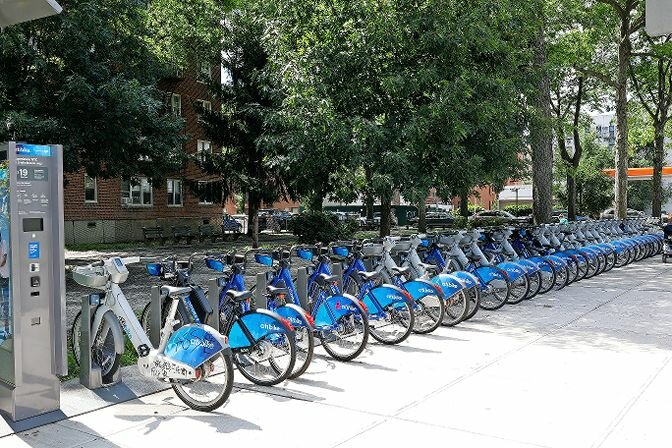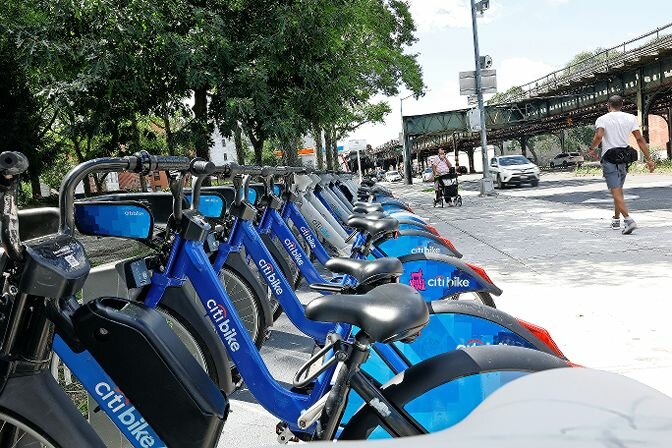Citi Bike expands in the Bronx: More docking stations and support from residents
Citi Bike has continued its commitment to expand into the outer boroughs, specifically the Bronx.
Citi Bike, owned by parent company Lyft, currently operates the majority of local docking stations centralized in the Kingsbridge and Kingsbridge Heights area, totaling 25 stations.
In total, as of 2023, Citi Bike owned 1,700 docking stations with more than 27,000 bikes and counting as they continue to expand.
In March 2023, Community Board 8’s traffic and transportation committee met with transportation department representatives to discuss Citi Bike’s planned expansion into the Bronx and into the CB8 coverage area.
Riverdale resident Robert Marcus, while not an avid Citi Bike user, is an avid cyclist. He said the purpose of the Citi Bikes is simple: to give people access to bikes for them to ride from point A to point B without having to worry about locking up bikes or bringing them into their apartment buildings.
Bikes are currently allowed in some commercial office buildings, as per the city’s Bikes in Buildings Program, initiated in 2009 and responsible for helping make cycling to work accessible. For residential buildings, allowing bicycles inside is up to the discretion of the landlord, and they are not obligated to provide tenants with bicycle parking, whereas employers under official city bike programs offer bicycle parking.
According to the transportation department, the city’s building bike program has provided parking inside of commercial buildings for more than 13,000 bicycles.
For a cyclist, Marcus said, Citi Bikes are an attractive addition to the mass public transportation the city offers.
“The idea was to get people who were willing to bike a way to do it (affordably),” Marcus said.
The end of the 1-train line is located by 242 Street and Broadway. If passengers ride to the very end, for a mere $2.90, they could make it all the way to Coney Island.
Marcus said this defines affordability. He said providing city residents with a similar structure for biking should be an option available to them.
Marcus said the problem of docking stations taking up parking spots is a non-issue for him. In front of his home, three parking spots were eliminated from the corner after trucks repeatedly struck cars. His response to that loss and the loss of parking for bikes is the same, “that’s just the way it goes.”
Mark Wishnia, a Spuyten Duyvil resident, has a similar take on docking stations taking up parking spots; he doesn’t care.
“A Citi Bike dock can hold anywhere from 10 to 50 bikes and, in that same space, you may be able to have three cars,” Wishnia said.
He said the dock was a better use of the spaces as it serves more people than three passenger cars and the bikes are publicly accessible, all day every day. According to Wishnia, a dock maximizes the space.
In recent social media posts, residents have criticized the rise in Citi Bike stations locally, stating bikes are often left lying in parks after not being docked properly.
The city’s parks department said bikes left in parks are moved to the perimeter, where Lyft collects them.
Lyft did not respond to requests for comment at press time.
When Citi Bike first launched in 2013, it began with 330 stations located in lower Manhattan and Brooklyn before branching out into mid-Manhattan, Brooklyn and Queens. In the most recent phase, in 2019, Citi Bike planned to expand further through the boroughs up to Inwood and finally into the Bronx.
The requirements for Citi Bike docking stations include: they must not intersect with crosswalks, be in bus stops, be near fire hydrants, not block driveways, curb cuts, or travel lanes, and must leave appropriate sidewalk clearance for pedestrians.
Other docking station rules state they must be in places that allow round-the-clock access and they are allowed to be on parks department property, city property or private property at the discretion of the landowner.
Costs for the bikes can range from $205 for a year subscription, $4.49 for a 30-minute ride, or $19 for a day pass with unlimited 30-minute rides for the day. The program also provides reduced fare bike shares for residents living in New York City Housing Authority and those receiving SNAP benefits, for $5 a month.
For residents like Marcus and Wishnia, biking is a convenient way for them to get around and they view the additional docking stations as an opportunity for more people to partake in the mode of transit.
“I think they’re a great and convenient way to get around if they’re available. There’s really no hurdles with it other than some hills here and there,” Wishnia said.












